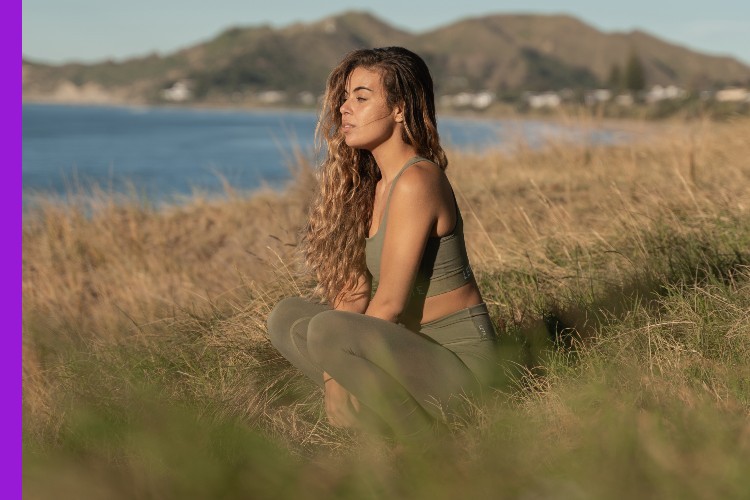
Activewear brand LETE (worn by model pictured) is made with renewable bamboo fabrics.
Competing in the global activewear market is no easy feat.
Nor is creating a sustainable business with a goal to regenerate the world’s rainforests.
But that’s exactly what Westpac business customers Dan Wilson and Paulina Ciurzynska set out to do with their new yoga and athleisure brand - LETE.
While living on the Whangaparaoa Peninsula, Dan and Paulina saw the negative effects of pollutants in the environment first-hand and decided to create a brand that would have a positive impact.
“I’ve always been an environmentalist and a member of Green Peace and wanted to give back to the planet,” Dan said.
“I’ve surfed my whole life, so I’ve seen the damage up close and personal and wanted to create an organisation that can give back.”
After spending two years in development phases, LETE was launched online in January 2021 and for every item sold they buy around one square metre of rainforest.
“At the moment we’re buying rainforest in Australia’s Northern Territory, and we will soon look at Indonesia and the Amazon. You can buy up to an acre of rainforest in the Amazon for only $2.50,” he said.
The founders are committed to replanting and regenerating rainforests globally and the company works with HalfCut to buy plots.
The global fashion industry is responsible for 1.2 billion tonnes of CO2 equivalent each year, according to Australia’s Climate Council. The World Economic Forum labelled fashion, and its supply chain, as the third largest polluter after food and construction in a 2021 report.
Another way LETE is tackling this issue is by using fabrics made of one of the world’s most renewable resources – bamboo.
Bamboo grows extremely quickly compared to cotton and other natural fibres, meaning it’s a renewable resource. One culm of bamboo has been recorded to grow 39 inches in 24 hours and the plant doesn’t need irrigation or fertilisers to grow as cotton does.
The bamboo, which is made into a fabric called tanboocel is produced in China because that’s where the bamboo is sourced. To keep emissions down, the business partners also manufacture in China and have their collection bulk-shipped to New Zealand.
“We design our garments in New Zealand and test our samples on the North Shore in Auckland. We invested in stock pre-emptively so thankfully we haven’t had stock issues during lockdowns. We’re holding more stock than we usually would so we can quickly distribute to our customers.
“We are committed to sustainable ethics within our manufacturing process and have a Business Social Compliance Initiative (BSCI) audit every year to assess and improve our supply chain standards,” he said.
In light of lockdowns impacting bricks and mortar retail, the founders of LETE also decided to only focus on an eCommerce business model and pop-up stores.
They have created a mobile garment rack, which was able to be driven around Auckland during Level Three.
And seeing as the clothing industry is such a large producer of waste and microplastics, Dan and Paulina’s goal is to have zero polyester in their garments within the next two years.
“That’s a big goal because we need elastane. At the moment we use recycled elastane, but we are always looking to improve.
“Our sustainability goals are what gets us out of bed in the morning.”
LETE comes at a time in which businesses globally are setting ambitious climate goals and the banking industry is supporting these initiatives with sustainable finance.
Westpac NZ has set the goal to enable $10b in sustainable finance by 2025.
